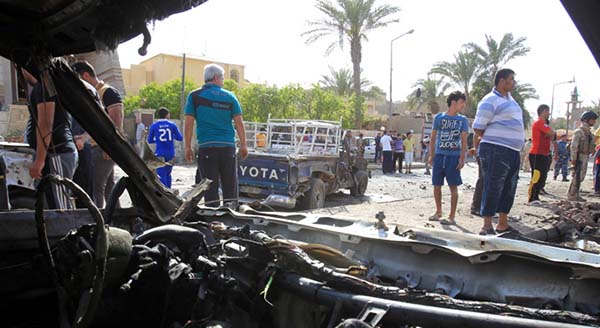BAQUBA, Iraq - Two bombs exploded outside a Sunni Muslim mosque in the Iraqi city of Baquba as worshippers left after Friday prayers, killing at least 43 people in one of the deadliest attacks in a month-long surge in sectarian violence.
Attacks on Sunni and Shi'ite mosques, security forces and Sunni tribal leaders have spread since troops raided a Sunni protest camp near Kirkuk a month ago, and fears are intensifying of a return to all-out Shi'ite-Sunni conflict.
Increasingly sectarian civil war in neighboring Syria is emboldening Iraqi Sunni insurgents and straining relations between the two Muslim groups in Iraq, where tensions are at their worst since U.S. troops pulled out at the end of 2011.
On Friday, one blast exploded outside the mosque in Baquba, about 50 km (30 miles) northeast of the capital of Baghdad, and a second explosion tore into crowds of people rushing to help victims of the first attack, police said.
Local television showed images of bodies on the ground outside the mosque, pools of blood and scattered shoes of the victims. Police vehicles rushed wounded away from the scene.
"I was about 30 meters (yards) from the first explosion. When the first exploded, I ran to help them, and the second one went off. I saw bodies flying and I had shrapnel in my neck," said Hashim Munjiz, a college student, at the site.
No group claimed responsibility for the attack, but Sunni Islamist insurgents and al Qaeda's local wing, Islamic State of Iraq, have stepped up attacks since the start of the year to try to provoke a wide-scale sectarian confrontation like the slaughter that killed tens of thousands of Iraqis in 2006-2007.
Shi'ite Islamist militias, which fought U.S. troops for years after the 2003 invasion, have said they are prepared in case they need to return to war. But Sunni insurgents sometimes hit Sunni targets to provoke conflict, including tribal leaders and politicians who oppose their extremist agenda.
On Thursday, a suicide bomber set off his explosives in a Shi'ite Muslim mosque in the ethnically mixed city of Kirkuk, killing at least eight among mourners gathered to pay respects to people killed in a bombing a day earlier.
The same day, three car bombs exploded in busy markets in eastern and northeastern Shi'ite districts of Baghdad, killing at least 14 people.
After U.S. troops left in 2011, insurgents were carrying out at least one big attack a month, but since the start of 2013, al Qaeda and other armed Sunni Islamist groups have increased attacks including a string of high-profile suicide blasts.
According to the United Nations, April was Iraq's bloodiest month for almost five years, with 712 people killed.
Also since the American withdrawal, Iraq's coalition government has been caught up in a power struggle between majority Shi'ites, minority Sunnis and ethnic Kurds who split cabinet posts among them. Rivals accuse Shi'ite Prime Minister Nuri al-Maliki of sidelining them to shore up Shi'ite power.
Sunnis, who lost their dominance when the U.S.-led invasion toppled Saddam Hussein, have been protesting for months against Maliki, demanding reforms to tough anti-terrorism laws they say are used to unfairly target their sect.
Iraqi Sunni insurgents, some linked to al Qaeda, have intensified attacks this year, claiming an alliance with the al-Nusra Front Islamist group fighting against Syrian President Bashar al-Assad. (Reuters)

